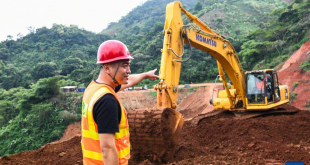Published: January 04,2024
By Tom Watkins

JIN DING/CHINA DAILY
The world needs much more understanding than what it has now. China and the United States, as the world’s two major powers, should lead the way in restoring people-to-people, cultural, educational, governmental and nonprofit exchanges to promote sound US-China relations while building a better collective future.
The results of the dialogue the two countries’ leaders hold must have a trickle-down effect, helping other countries feel confident that there is a positive, prosperous future ahead for all. People-to-people exchanges are an integral part of President Xi Jinping’sforeign policy. And I wish there was an equally big champion of people-to-people exchanges in the US, too.
Some would argue for “decoupling”, disengaging or “de-risking” the US from China, but perhaps a bigger risk would be allowing domestic political pressure to drive the two countries apart. China-US economic and trade cooperation has bought benefits to the people of both China and the US for half a century.
While we need to continue to work toward building sensible economic ties, it is vital that China and the US continue to follow the “Seven Cs” — communication, collaboration, cooperation, coordination and competition while avoiding unnecessary confrontations and conflict. This would allow the world to sleep well and prosper.
We also need to strengthen our people-to-people educational, cultural and sub-national collaborations and exchanges that have receded in recent years. These connections are the foundation of understanding and mutual respect, which in turn fuel the most important bilateral relationship in the world today.
Too much of the current political narrative is vilifying more than amplifying the cooperation aspect of the US-China relationship on both sides of the Pacific. Today, roughly two-thirds of Americans hold a negative view of China and some politicians would like to drive up that number.
Recent years have seen some heartening progress in facilitating travel and people-to-people exchanges. China has resumed group tours to the US, and the two sides have agreed to increase passenger flights. Yet student exchanges remain significantly below pre-pandemic highs. The number of American students studying in China is frighteningly low. Going forward, we need to continue taking concrete steps no matter how minor they may be to rebuild these vital exchanges.
As the 21st century unfolds, both the US and China should be the beacons for building bridges rather than “Great Walls”. As the China-US Heartland Association proclaims in its mission, “Not all bridges are built of concrete and steel. Equally important bridges are built on friendship, culture, communication, cooperation and where these bridges exist, communities flourish.” This approach would cement the people-to-people relationship between these two great nations in the hope of shaping a 21st century that benefits all of humanity.
In a world fraught with tension and uncertainty, a concerted effort to address the problems and existential threats facing both countries, rather all of humanity, is needed. It is imperative that we find ways to develop a shared vision and common agenda in areas that are in our collective national interests while we have open dialogue on topics where we disagree.
I call on philanthropists, not simply governments in the two countries, to join forces to create and endow a robust international exchange, a people-to-people organization that connects students, (from grade school to lifelong learners) artists, writers, athletes, tourists, educators, health and behavioral healthcare professionals, poets, sub-national government officials and NGOs between our two countries to listen, to understand and build bridges that will help sustain peace and prosperity for all.
I propose calling it the “Deng-Carter Exchange Bridge for International Peace and Prosperity” for the vision our respective leaders had. Former US president Jimmy Carter and late Chinese leader Deng Xiaoping looked beyond our countries’ many differences, found common ground and saw the value of connecting our people. We need to super charge this vision today. They believed rapprochement and interaction between our people would make the world safer and benefit both the US and China. They were as visionary as they were wise. We need this enlightened thinking more than ever before.
The global connections formed through these exchanges and personal interactions are vital for fostering understanding and unity. They lay the groundwork for meaningful dialogues, thoughtful synergy, mutual respect, joint prosperity and peaceful collaborations. It’s inspiring to see the positive impact these exchanges can and have had, shaping a better tomorrow for both our nations and the world.
Going forward, all major global issues will intersect at the corner of Beijing and Washington. Building mutual understanding and respect today will assure we can celebrate the 100-year anniversary of this vital relationship in the future. The thought of the alternative is unthinkable.
Our children, grandchildren and all of humanity will thank us for our efforts.
The author is the former Michigan State Superintendent of schools.
China Daily
 Africa -China Review Africa -China Cooperation and Transformation
Africa -China Review Africa -China Cooperation and Transformation
